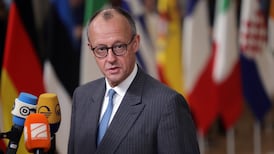Brussels and European capitals will parse and deconstruct Theresa May’s statement to the House of Commons on Monday with great care. What will she be asking for when she comes to the EU summit in Brussels on Thursday?
They hear her and her ministers’ assurances that they know there can not be a renegotiation of the withdrawal treaty agreed last month. Perhaps then, a declaration attached to the treaty, a clarification.
They will take comfort above all from her reaffirmation of her commitment to the purpose and meaning of the Northern Ireland backstop. It’s not essentially about the permanent customs union membership that the Brexiteers obsess over, but how to honour the obligation to keep a frictionless border in Ireland. It is an obligation, it is increasingly clear, that many Tories would tear up.
May made clear that the backstop – the preservation of that frictionless border – cannot be called into question. She reminded MPs that the “hard-won peace” that had been built in Northern Ireland over the past two decades had been built “around a seamless border”.
“I have been there and spoken to some of those people. They do not want their everyday lives to change as a result of the decision we have taken. They do not want a return to a hard border.
“And if this House cares about preserving our union, it must listen to those people, because our union will only endure with their consent.”
Who is threatening the union, she asks. Clearly, it is those pushing northerners fearful of losing that frictionless border into the arms of those who say the only real alternative is a united Ireland.
Not enough
But if the backstop is not at issue, its potential permanence and departure from it are. Reassurances that it may never be used because transition can be extended, that it may be replaced by a technological solution, that the EU is as uncomfortable with a permanent arrangement as the UK, are simply not enough, she promises to tell EU leaders in the next few days. It is a message they do not want to hear.
“I am clear from what I have heard in this place,” she says, “and from my own conversations, that these elements do not offer a sufficient number of colleagues the reassurance that they need.”
Her backbenchers are using the line that the UK is be “held hostage” in the customs union in perpetuity.
It is an argument Minister for Foreign Affairs Simon Coveney attacked on Monday morning ahead of her speech. Far from being an imposition by the EU, he argued, "the backstop was never and is not an offer of one side to the other. It is a negotiated solution that both sides signed up to ... and it is there for a good reason. It is a last-resort insurance mechanism that will only kick in if we are unable to resolve the Border issues through negotiating a comprehensive future relationship, which everybody believes is possible". (Well, perhaps not everybody.)
Logic
EU leaders accept the logic of an insurance policy – one party cannot renege on it unilaterally.
They will point to paragraph 19 of the Political Declaration, an outline deal on the UK’s future relationship with the EU, which was also agreed last month: “The parties recall their determination to replace the backstop solution on Northern Ireland by a subsequent agreement that establishes alternative arrangements for ensuring the absence of a hard border on the island of Ireland on a permanent footing.”
Can they rephrase that to say the same thing for a declaration, a clarification in language more palatable to May? To go further is simply not on.










